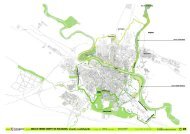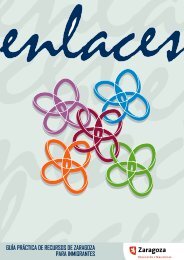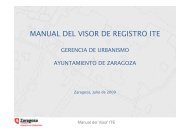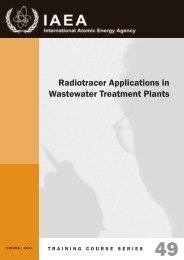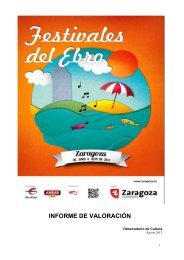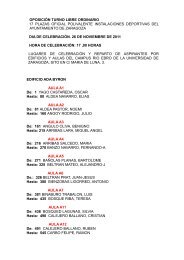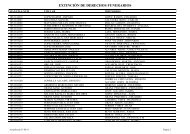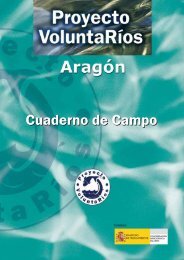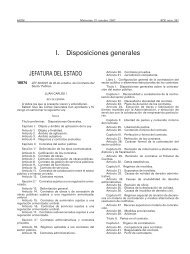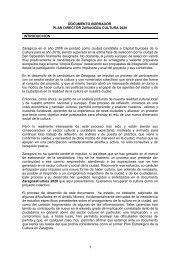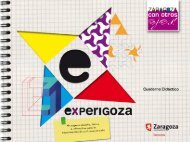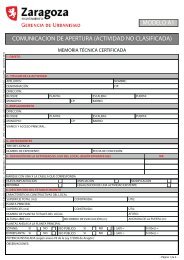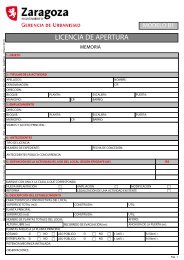Chapter 4: Implementation <strong>of</strong> international agreements and commitments57deal with CDM projects, including technical capacityfor project formulation, institutional capacity forinternational negotiations and managerial skills incarbon finance, (iii) low coordination betweenministerial bodies in defining sectors <strong>of</strong> the economythat will be targeted for emissions reduction projects.One can add to these limited knowledge <strong>of</strong> theeconomic advantages <strong>of</strong> carbon finance and lack <strong>of</strong>national data for the estimation <strong>of</strong> baseline emissions.Vienna Convention for the Protection <strong>of</strong> theOzone Layer<strong>Albania</strong> ratified the Vienna Convention for theProtection <strong>of</strong> the Ozone Layer and the MontrealProtocol on Substances that Deplete the Ozone Layerin 1999. A National Ozone Unit was established in2003 and, by 2008, with financial support from theMultilateral Fund <strong>of</strong> the Montreal Protocol, thecountry had managed to phase out the ozonedepletingsubstances (ODS) covered by Annexes A,B and E <strong>of</strong> the Montreal Protocol. Other obligationsresulting from the Montreal Protocol, namelyimplementing a licensing, monitoring and reportingsystem on activities related to ODS, and prohibitingthe production and importation <strong>of</strong> ODS-usingequipment, have partially been fulfilled. In 2006<strong>Albania</strong> adhered to the four amendments to theMontreal Protocol: the London Amendment, theCopenhagen Amendment, the Montreal Amendment,and the Beijing Amendment, which repeatedlystrengthened the Montreal Protocol by bothcontrolling additional ODS and advancing the dateby which already controlled substances must bephased out.The 2003 Country Programme for Phasing Out ODShas proposed several projects for the acceleratedphase-out <strong>of</strong> ODS. All projects have been technicallyand financially supported by the Multilateral Fund <strong>of</strong>the Montreal Protocol through UNIDO as animplementing agency. During recent years, the mainfocus has been placed on the elimination <strong>of</strong>hydr<strong>of</strong>luorocarbon (HCFC) substances classified inAnnex ɋ Group I <strong>of</strong> the Montreal Protocol, inaccordance with the Montreal Amendment to theProtocol. A national HCFC phase-out managementplan has recently been prepared. The plan foreseesthe gradual reduction <strong>of</strong> HCFC import quotas startingfrom 2013, in accordance with Decision XIX/6 onadjustments to the Montreal Protocol with regard toAnnex C, Group I substances for article 5 Parties.The import <strong>of</strong> ODS, used equipment and newequipment are only allowed with a permit issued byMoEFWA, which maintains a registry <strong>of</strong> ODSimports, exports and consumption. Importing ODSincluded in Annex C, Group I is allowed only on thebasis <strong>of</strong> annual quotas and only through customsfacilities which have certified personnel and specialequipment for detecting and identifying them.<strong>Albania</strong> has an appropriate licensing system forHCFCs. Import quotas and permits, price controlthrough environmental taxes for HCFCs and HCFCcontainingequipment, a ban on the import <strong>of</strong> HCFCcontainingequipment, and new HCFC installationsare stipulated in the 2010 DCM No. 290.In the framework <strong>of</strong> the Montreal Protocol and theCountry Programme for Phasing Out ODS, theNational Action Plan designed to phase out HCFCshas been approved. Since the obligation to phase outCFCs has been realized, for the period 2010-2013another indicator for monitoring will be introduced,maintaining the quota 120 tons <strong>of</strong> HCFCs unchangeduntil 2013 (under the Montreal Protocol). It isintended that the amount <strong>of</strong> 120 tons will be reducedby 10 per cent, to 108 tons, from 2013 to 2015. Thelong-term objective is to reduce it to 29 tons by 2040.Hazardous chemicals and waste managementAs <strong>of</strong> 1999, <strong>Albania</strong> is a Party to the BaselConvention on the Control <strong>of</strong> TransboundaryMovements <strong>of</strong> Hazardous Wastes and their Disposal.<strong>Albania</strong> ratified the Stockholm Convention onPersistent Organic Pollutants in 2004, and theRotterdam Convention on the Prior InformedConsent Procedure for Certain Hazardous Chemicalsand Pesticides in International Trade in 2010. Thecountry recognizes the benefits <strong>of</strong> coordinatingimplementation <strong>of</strong> the three conventions, and hasenvisaged activities to integrate their implementation,e.g. by establishing a chemicals bureau. Institutionalissues will have to be solved, first, to ensure building<strong>of</strong> synergies among the three conventions. For themoment, the National Focal Point for the BaselConvention is within MoEFWA, while the DNA forthe Rotterdam Convention is shared between MoHand MoAFCP. Neither an <strong>of</strong>ficial contact point nor anational focal point for the exchange <strong>of</strong> informationhas been nominated for the Stockholm Convention.<strong>Albania</strong> has national legislation regulating themanagement <strong>of</strong> chemicals and dangerous substances.All types <strong>of</strong> waste (hazardous or not) that are theobject <strong>of</strong> import, export and transboundarymovements are subject to control and they requirespecial permission from the Council <strong>of</strong> Ministers (forimport) and permission from the Minister <strong>of</strong> theEnvironment (for export and transboundarymovements). <strong>Albania</strong> restricts the export and transit<strong>of</strong> hazardous wastes and other wastes for finaldisposal and for recovery by the Ministry <strong>of</strong>
58 Part I: Policymaking, planning and implementationEnvironment 2003 Regulation on Procedures forApproving <strong>of</strong> Permit for Export <strong>of</strong> Waste and Permitfor Transboundary Movements <strong>of</strong> Waste, No. 4. Theimport <strong>of</strong> hazardous wastes for final disposal andrecovery is prohibited according to the 2003 DCM onProcedures for Import <strong>of</strong> Waste for Reuse, Recoveryand Recycling Purposes, No. 806 (Chapter 7).On chemicals, a draft decision has been preparedregarding bans and restrictions <strong>of</strong> production, placingon the market and use <strong>of</strong> certain dangeroussubstances, mixtures and articles, which partiallytransposes REACH. Two years after <strong>Albania</strong>’sadherence to the Stockholm Convention, theGovernment adopted a national implementation planfor the reduction and elimination <strong>of</strong> persistentorganic pollutants (POPs). During its preparation, aninventory <strong>of</strong> POPs in <strong>Albania</strong> was carried out.Supported by international bodies and bilateraldonors, <strong>Albania</strong> has made progress in resolving someissues indicated in the Plan. Several projects havebeen implemented related to the removal <strong>of</strong> pesticidePOPs (Chapter 8).The DNAs for the Rotterdam Convention includeMoH (for industrial chemicals) and MoAFCP (forpesticides) while the role <strong>of</strong> the Official ContactPoint is played by the Ministry <strong>of</strong> Foreign Affairs(MoFA). Despite MoEFWA, it has appointed a focalpoint to deal with implementation issues. Prior to theratification <strong>of</strong> the Convention several itsrequirements were incorporated into the nationallegislation, including the 2003 Law on ChemicalSubstances and Agents and the 2005 Law on PlantProtection Service. At present, neither importresponses nor notifications are being submitted to theConvention Secretariat.Within the framework <strong>of</strong> the Strategic Approach toInternational Chemical Management (SAICM),<strong>Albania</strong> is currently implementing the project“Strengthening <strong>of</strong> Capacities on SAICMImplementation”, with support from the UN Institute<strong>of</strong> Training and Research. The project activitiesinclude: (i) preparing a National SAICM CapacityAssessment through updating the National Pr<strong>of</strong>ile,(ii) legal and institutional strengthening(establishment <strong>of</strong> an inter-ministerial coordinationmechanism on chemicals management), (iii)development <strong>of</strong> a national mechanism forinformation exchange and the National ChemicalsManagement Database.The SAICM National Focal Point is within IPH.MoEFWA reported lack <strong>of</strong> capacity for dealing withchemicals issues, notably a lack <strong>of</strong> legal experts. TheNational Implementation Plan <strong>of</strong> SAA for the period2009-2014 foresees the consolidation <strong>of</strong> theorganizational structure <strong>of</strong> MoEFWA throughinclusion <strong>of</strong> an expert in the chemicals field.Marine environment protectionMarine resources and ecosystems are underincreasing threat <strong>of</strong> degradation in <strong>Albania</strong> because<strong>of</strong> the development <strong>of</strong> infrastructure, fishing,shipping and tourism. Since the first EPR, <strong>Albania</strong>has been working to protect and preserve the marineenvironment and resources at both policy and legallevels, but also through the implementation <strong>of</strong>infrastructure improvements and clean-up activitiesin port zones.The Convention on the Protection <strong>of</strong> theMediterranean Sea from Pollution and most <strong>of</strong> itsaccompanying protocols, including the Protocol onSpecially Protected Areas, were integrated into thenational legal framework in 2000. <strong>Albania</strong> ratifiedthe 2008 Integrated Coastal Zone Management(ICZM) Protocol in 2010. In July 2001, <strong>Albania</strong>ratified the 1996 Hazardous Wastes Protocol and the1994 Offshore Protocol. <strong>Albania</strong> has recently joinedthe 2002 Emergency Protocol and designatedcompetent national authorities responsible forprevention <strong>of</strong>, preparedness for and response tomarine pollution. The National Contingency Plan forEmergency Cases on the Sea is being prepared torespond, inter alia, to accidental marine pollution.According to the 2007 national report to theConvention governing body, implementationstrategies, action plans and programmes have beendeveloped. Most <strong>of</strong> the Convention’s requirementswere transposed by the 2002 Law on Protection <strong>of</strong>Marine Environment from Pollution and Damage,No. 8905.Furthermore, the 2002 Law on Protected Areasincluded a limited number <strong>of</strong> marine protected areasand defined the protection <strong>of</strong> marine environments asan important priority for the future. Karaburun(Vlore) was proclaimed the first marine national parkin 2010. In conjunction with this initiative, analyses<strong>of</strong> marine areas have been conducted covering suchaspects as their value in natural, historical, cultural,social and economic terms. The results lay the basisfor establishing a network <strong>of</strong> marine areas.<strong>Albania</strong> has ratified the International Convention forthe Prevention <strong>of</strong> Pollution from Ships (MARPOL73/78) and its annexes I/II and III-V. The country isalso Party to the 2004 International MaritimeOrganization’s International Convention for theControl and Management <strong>of</strong> Ships’ Ballast Water andSediments.
- Page 1 and 2:
UNITED NATIONS ECONOMIC COMMISSION
- Page 6 and 7:
vPrefaceThe second EPR of Albania b
- Page 8 and 9:
viiLIST OF TEAM MEMBERSMr. Antoine
- Page 10 and 11:
ixMinistry of Agriculture, Food and
- Page 12 and 13:
xiCONTENTSForeword ................
- Page 14 and 15:
8.3 Biological diversity ..........
- Page 16 and 17:
xvPageChapter 8Table 8.1:Table 8.2:
- Page 18 and 19:
xviiPageLIST OF PHOTOSIntroductionP
- Page 20 and 21:
xixLIST OF ABBREVIATIONSAICASCICANP
- Page 22 and 23:
xxiSIGNS AND MEASURES .. not availa
- Page 24 and 25:
xxiiiExecutive summaryThe first Env
- Page 26 and 27:
The entire education system is subj
- Page 28 and 29:
was done by international consultan
- Page 30 and 31:
1Introduction I.1 Physical contextA
- Page 32 and 33:
Introduction3The country has deposi
- Page 34 and 35:
Introduction5Photo I.1: Ruins of Sk
- Page 36: PART I: POLICYMAKING, PLANNING AND
- Page 39 and 40: 10 Part I: Policymaking, planning a
- Page 41 and 42: 12 Part I: Policymaking, planning a
- Page 43 and 44: 14 Part I: Policymaking, planning a
- Page 45 and 46: 16 Part I: Policymaking, planning a
- Page 47 and 48: 18 Part I: Policymaking, planning a
- Page 49 and 50: 20 Part I: Policymaking, planning a
- Page 51 and 52: 22 Part I: Policymaking, planning a
- Page 53 and 54: 24 Part I: Policymaking, planning a
- Page 55 and 56: 26 Part I: Policymaking, planning a
- Page 57 and 58: 28 Part I: Policymaking, planning a
- Page 59 and 60: 30 Part I: Policymaking, planning a
- Page 61 and 62: 32 Part I: Policymaking, planning a
- Page 63 and 64: 34 Part I: Policymaking, planning a
- Page 65 and 66: 36 Part I: Policymaking, planning a
- Page 67 and 68: 38 Part I: Policymaking, planning a
- Page 69 and 70: 40 Part I: Policymaking, planning a
- Page 71 and 72: 42 Part I: Policymaking, planning a
- Page 73 and 74: 44 Part I: Policymaking, planning a
- Page 75 and 76: 46 Part I: Policymaking, planning a
- Page 77 and 78: 48 Part I: Policymaking, planning a
- Page 79 and 80: 50 Part I: Policymaking, planning a
- Page 81 and 82: 52 Part I: Policymaking, planning a
- Page 83 and 84: 54 Part I: Policymaking, planning a
- Page 85: 56 Part I: Policymaking, planning a
- Page 89 and 90: 60 Part I: Policymaking, planning a
- Page 91 and 92: 62 Part I: Policymaking, planning a
- Page 93 and 94: 64 Part I: Policymaking, planning a
- Page 96 and 97: 67Chapter 5ECONOMIC INSTRUMENTS AND
- Page 98 and 99: Chapter 5: Economic instruments and
- Page 100 and 101: Chapter 5: Economic instruments and
- Page 102 and 103: Chapter 5: Economic instruments and
- Page 104 and 105: Chapter 5: Economic instruments and
- Page 106 and 107: Chapter 5: Economic instruments and
- Page 108: PART III: INTEGRATION OF ENVIRONMEN
- Page 111 and 112: 82 Part III: Integration of environ
- Page 113 and 114: 84 Part III: Integration of environ
- Page 115 and 116: 86 Part III: Integration of environ
- Page 117 and 118: 88 Part III: Integration of environ
- Page 119 and 120: 90 Part III: Integration of environ
- Page 121 and 122: 92 Part III: Integration of environ
- Page 124 and 125: 95Chapter 7WASTE MANAGEMENT7.1 Intr
- Page 126 and 127: Chapter 7: Waste management97sold f
- Page 128 and 129: Chapter 7: Waste management99SitesC
- Page 130 and 131: Chapter 7: Waste management101Table
- Page 132 and 133: Chapter 7: Waste management103• C
- Page 134 and 135: Chapter 7: Waste management105sever
- Page 136:
Chapter 7: Waste management107(b) E
- Page 139 and 140:
110 Part III: Integration of enviro
- Page 141 and 142:
112 Part III: Integration of enviro
- Page 143 and 144:
114 Part III: Integration of enviro
- Page 145 and 146:
116 Part III: Integration of enviro
- Page 147 and 148:
118 Part III: Integration of enviro
- Page 149 and 150:
120 Part III: Integration of enviro
- Page 151 and 152:
122 Part III: Integration of enviro
- Page 153 and 154:
124 Part III: Integration of enviro
- Page 155 and 156:
126 Part III: Integration of enviro
- Page 157 and 158:
128 Part III: Integration of enviro
- Page 159 and 160:
130 Part III: Integration of enviro
- Page 161 and 162:
132 Part III: Integration of enviro
- Page 164 and 165:
135Chapter 10HUMAN HEALTH AND ENVIR
- Page 166 and 167:
Chapter 10: Human health and enviro
- Page 168 and 169:
Chapter 10: Human health and enviro
- Page 170 and 171:
Chapter 10: Human health and enviro
- Page 172 and 173:
Chapter 10: Human health and enviro
- Page 174 and 175:
Chapter 10: Human health and enviro
- Page 176 and 177:
Chapter 10: Human health and enviro
- Page 178:
Chapter 10: Human health and enviro
- Page 182 and 183:
153Annex IIMPLEMENTATION OF THE REC
- Page 184 and 185:
The new 2011 Law on Environmental P
- Page 186 and 187:
Recommendation 3.2:Albania needs to
- Page 188 and 189:
Recommendation 4.2:The Ministry of
- Page 190 and 191:
for 2004 was prepared within the St
- Page 192 and 193:
163Chapter 6: WATER MANAGEMENTRecom
- Page 194 and 195:
There is no updated water resources
- Page 196 and 197:
international consulting and author
- Page 198 and 199:
it is limited only to the level of
- Page 200 and 201:
taken. In addition, NES2, under MoE
- Page 202 and 203:
173Chapter 12: HUMAN HEALTH AND THE
- Page 204:
Recommendation 12.5:(a) The Ministr
- Page 207 and 208:
178Worldwide agreementsYear1979 (BO
- Page 210 and 211:
181Annex IIISELECTED ECONOMIC AND E
- Page 212 and 213:
183Land resources and soil 2002 200
- Page 214:
Education 2002 2003 2004 2005 2006
- Page 217 and 218:
188Law on Local Tax System, No. 963
- Page 220 and 221:
191SourcesIndividual authors1. Bego
- Page 222 and 223:
19336. Albania, Ministry of Environ
- Page 224 and 225:
19568. National Agency of Natural R
- Page 226 and 227:
197101. International POPs Eliminat
- Page 228 and 229:
199UNDP and Ministry of Environment
- Page 230:
201172. National Agency for Environ



